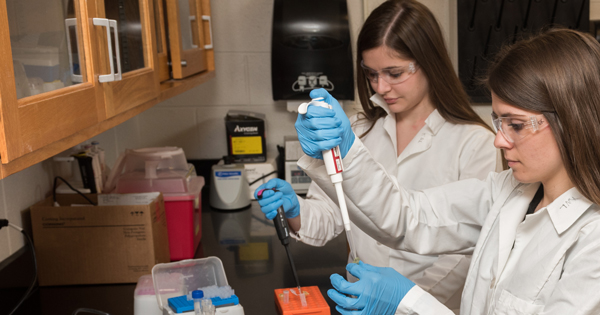


Delaware Center for Neuroscience
Photo by Evan Krape November 30, 2017
$10.9 million federal grant supports research collaboration
University of Delaware studies on the effects of traumatic stress in women and how connections in the brain help adults control their impulses are two of the projects supported by a new federal grant to the Delaware Center for Neuroscience Research.
The five-year, $10.9 million grant from the National Institutes of Health (NIH) will support the continued work of the center, which is a partnership between the University of Delaware and Delaware State University (DSU), where it is housed.
The center was established in 2012 through a similar NIH grant to the Center of Biomedical Research Excellence (COBRE) at DSU, which is the lead institution. With that Phase I grant completed last year, the new funding for Phase II will continue to 2022.
Researchers at UD and DSU have worked on a variety of projects through the center, developing the state’s capabilities in advanced brain imaging and training graduate students in neuroscience.
During the second phase of the grant, investigators expect to use non-invasive imaging techniques to explore brain function in living humans and laboratory animals.
“The overarching goal of our neuroscience center is to bring together and support neuroscientists working at multiple scales, from human subjects to rodent and invertebrate models, to improve our understanding of the dynamic function of the brain,” said Melissa Harrington, DSU professor of biology and director of the Center for Neuroscience.
Jeffrey Rosen, professor of psychological and brain sciences at UD and co-principal investigator with Harrington of the grant, said the center will build on the success it’s already had and expand its reach.
“Five years ago, our goal was to mentor young faculty [in the beginning stages of their research] and build interactions and collaborations,” he said. “For Phase II, the focus is still on support for junior faculty but also on facilitating infrastructure development.”
Funding in the second phase will help new faculty members prepare to pursue grant funding to establish their individual research programs, and will support the purchase of research instrumentation for UD’s Center for Biomedical and Brain Imaging.
Investigators who will be part of Phase II are Michael Gitcho and Y. Hwan Kim, in DSU’s Department of Biological Sciences, and Dayan Knox and Naomi Sadeh, in the Department of Psychological and Brain Sciences at UD.
Knox conducts research on the effects of traumatic stress on women, who are more likely than men to develop anxiety disorders after exposure to such stress.
He uses a rat model—where the impact of stress tends to be the opposite from humans, with a stronger effect in males than females—to try to understand how different ovarian hormone cycles can confer resilience or susceptibility to stress.
Sadeh examines how the brain allows individuals to control their impulses in challenging situations, such as times of strong negative emotions and mental fatigue, when self-control can be difficult. Her research seeks to understand how different regions of the brain work together in networks to promote this self-control.
The results of the research, Sadeh said, could be used to pinpoint what goes wrong with these brain connections in cases of mental illness and harmful behavior such as violence and substance use.
At DSU, Kim is studying Parkinson’s disease and working to develop potential combination therapies to treat it. Gitcho investigates how age, stress and changes in metabolism contribute to such diseases as Alzheimer’s and amyotrophic lateral sclerosis (ALS).
At an event this month celebrating the launch of Phase II, officials said the center is beneficial to researchers, students and the public.
“This NIH grant will allow our in-state institutions to continue their work at the Delaware Center for Neuroscience Research, and prepare the next generation of innovators, researchers and biomedical professionals,” said Gov. John Carney. The two universities have “an impressive capacity for collaboration and innovation,” he said.
U.S. Senator Tom Carper called the research critical. “Not only will this First State collaboration advance the study of the brain, but it will also attract talented students and scientists to our state,” he said.
Overall, Knox said, the grant award is a win-win. “Investing resources in a state like Delaware will help fund the next best ideas in neuroscience,” he said.
Earlier work at the neuroscience center
In 2012, Phase I established the Delaware Center for Neuroscience Research.
Over the next five years, it supported the projects of 13 investigators at the two universities and the renovation of a research facility at DSU. Some 85 journal articles were published by faculty affiliated with the center.
Also under Phase I, the two universities have established a mentoring program and an external advisory committee, and faculty members from both institutions have twice-yearly conferences and monthly meetings at which research is presented and critiqued, Rosen said.
In addition, he said, an agreement allows graduate students to take courses at either university—UD’s focus is more on behavioral research while DSU’s is more in the area of cell biology—expanding their educational opportunities.
Contact Us
Have a UDaily story idea?
Contact us at ocm@udel.edu
Members of the press
Contact us at 302-831-NEWS or visit the Media Relations website

